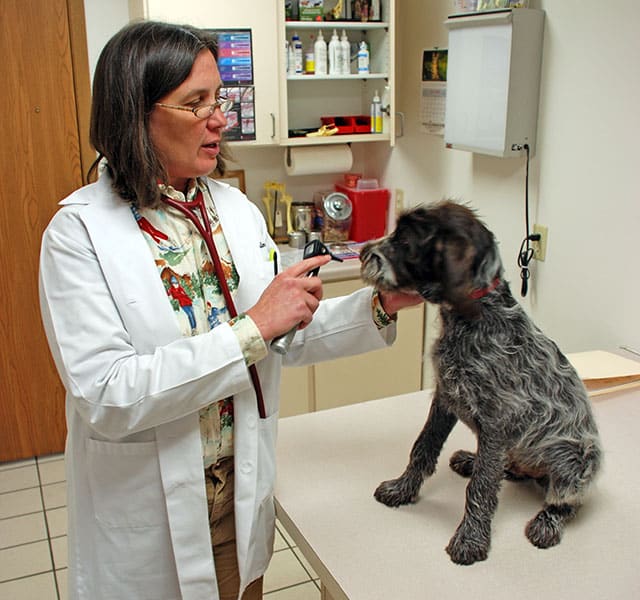
ATTENTION OWNERS: Please complete our club health surveys on your Cesky Fousek.
Link to Baseline Canine Health Monitoring Survey
Attention owners of CFNA dogs: Please complete this Health Survey when your dog is in the 18-24 month age range. It is helpful to have your dog’s registration and veterinary information available when you complete the survey. The Baseline Survey collects data on a wide array of canine disorders that may be associated with genetic factors. The data are used by the Breeding Committee to evaluate outcomes of previous breedings, to select future breeding stock and to identify potential health risks.
Health/Genetics Monitoring
Just as we require performance testing data on all our pups, we seek to secure health data on every pup as well. Dogs being considered for the breeding program must undergo a PennHip evaluation. This procedure provides an assessment for hip dsyplasia potential. Hip dysplasia is a devastating orthopedic disorder that is present in most medium and large breeds.
Each pup is evaluated for coat and conformation when it participates in a CFNA Intermdeiate Hunting Test. We assess teeth, bite, gait, size and structure. We also assess temperament—not only gun sensitivity but general disposition, friendliness with people and behavior toward other dogs.
The CFNA breeding committee works to incorporate advances in breeding technology, canine nutrition and puppy development into our program. We provide an annual seminar related to breeding at hunting dog evaluation to our judges and membership.
Cesky Fousek Database Link
We have developed an International searchable on-line database for pedigrees, health, and test information. This database is freely available to all worldwide (ceskyfouseknorthamerica.org). We are working with other national clubs to collect and upload data for a more complete dataset. These datasets can be downloaded for analysis upon request. Users can look up data on individual dogs, conduct test breeding analyses, and view breeding statistics.
Cesky Fousek Lifespan Study
Our Czech colleague, Silvie Neradilová, is conducting a study on longevity of the Cesky Fousek, including our Cesky Fousek North America bred club dogs. If you owned a Cesky Fousek (Bohemian Wirehaired Pointing Griffon) that has since died, your data would be very valuable to this study. The survey is very brief only about a page in length, and it can b e completed right on line. Please go to the link below and do the survey. Your furry-faced buddy on the other side of the rainbow bridge will thank you.
Cesky Fousek Lifespan Survey
Cesky Fousek Influence on Club Bred Dogs
The former Wirehaired Pointing Griffon Club of America is now the Cesky Fousek North America. Why? Because beginning in the 1980s, the club had been using the Cesky Fousek (English name, Bohemian Wire-haired Pointing Griffon) to improve the genetic diversity, temperament and hunting qualities of our dogs. Given the high proportion of Cesky Fousek in our litters, the club Board of Directors moved to change the club name and more importantly, to change our breeding practices and to breed dogs that will be internationally recognized as Cesky Fouseks (Bohemian Wirehaired Pointing Griffons). We have forged a close working relationship with Klub chovatelů českých fousků, the breed organizationfor the Cesky Fousek in the Czech Republic, and we are now importing pups through the club to develop our breeding program. We have used the Fédération Cynologique Internationale breed standard of the Cesky Fousek as our own breed standard since 1995, and we are now working to have our litters recognized by FCI. To see the percentage of Cesky Fousek in previous WPGCA litters, download the chart below.
Find the Cesky Fousek Lineage in your Dog
Scholarly Collaborations
In addition to testing and breeding programs, we also have scholarly collaborative activities. For example, blood from every domestic puppy and all imported dogs is submitted to the Cornell University Veterinary BioBank. This is a DNA bank that can be used for future genetic studies . Along with the blood, each dog owner must supply additional health, morphometric, and temperament information on a regular basis throughout the dogs’ entire life to accompany the stored DNA. These kinds of databases are very rare and extremely valuable scientific research resources for both canine and human diseases. A second project includes the sequencing of the complete genome of 67 of our dogs in a study to search for genetic markers for shoulder Osteochondritis Dissecans (OCD). Currently there are only about 500 complete dog genomes available worldwide making the addition of 67 a significant achievement. In a collaboration with Klub Chovatelů Českých Fousků, Česká zemědělská Univerzita v Praze (Czech Agricultural University in Prague), Cornell Veterinary BioBank, TGen (AZ), Queens University, Belfast, UK, and The University of Maine, we have initiated a genetic study of alopecia in dogs that might also be useful for understanding hair loss in humans. These are ambitious collaborations that would not be possible without a strong breed clubs and excellent records.
